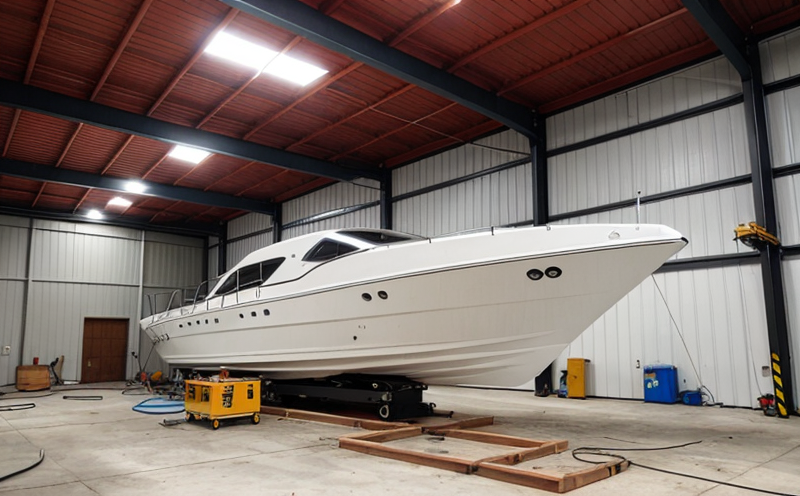ISO 604 Compressive Testing of FRP Hull Materials
The testing method specified in ISO 604 is a critical process used to evaluate the compressive strength and modulus of elasticity of fiber-reinforced plastic (FRP) hull materials. This procedure is essential for ensuring compliance with international standards and quality control requirements, particularly within the marine sector where structural integrity is paramount.
The testing involves subjecting carefully prepared specimens of FRP hull materials to progressively increasing compressive loads until failure occurs or a specified load level is reached. The process is meticulously controlled using sophisticated equipment that can accurately measure both the applied force and the resulting deformation of the material under test.
Compressive testing according to ISO 604 provides critical data on the mechanical properties of FRP hull materials, which are crucial for assessing their suitability in various marine applications. The results enable manufacturers and quality control personnel to make informed decisions about material selection and process optimization, ensuring that products meet the stringent requirements set by industry standards.
During the testing procedure, it is important to follow strict specimen preparation guidelines as outlined in ISO 604 to ensure accurate and reproducible test results. Specimens should be cut from larger FRP panels according to specified dimensions and orientation, with careful attention paid to minimizing defects or anomalies that could affect test outcomes.
The testing apparatus used for this procedure typically comprises a hydraulic press capable of applying controlled loads up to the specified limit. The press is equipped with sensors that provide real-time data on both load and displacement during the test. This information is crucial for determining the compressive strength and modulus of elasticity of the material being tested.
After completing the test, the results are analyzed and reported in accordance with ISO 604 guidelines. The report includes details such as the applied load at failure, the corresponding deformation, and any other relevant parameters that can help interpret the mechanical behavior of the FRP hull materials under compressive stress.
The importance of this testing method cannot be overstated, especially given the critical role that FRP hulls play in marine structures. By adhering to ISO 604 standards, manufacturers can ensure that their products meet rigorous quality and safety criteria, thereby enhancing overall product performance and reliability.
Understanding the nuances of compressive testing according to ISO 604 is essential for those involved in the design, manufacturing, and quality control processes within the marine sector. This knowledge allows stakeholders to make informed decisions about material selection and process optimization, ultimately leading to higher-quality products that can withstand the rigors of marine environments.
For R&D engineers working on new FRP materials or innovative designs for marine hulls, mastering this testing method is crucial. It provides a foundation for developing robust materials and structures that meet both current standards and future requirements. Compliance with ISO 604 ensures that products are reliable, safe, and capable of performing under extreme conditions.
By leveraging the insights gained from compressive testing according to ISO 604, procurement professionals can select suppliers who adhere to these stringent quality controls, ensuring consistency in material performance across different projects. This approach fosters trust within supply chains and contributes to long-term success in the marine industry.
Benefits
- Ensures compliance with international standards for FRP hull materials.
- Provides accurate and reproducible mechanical property data.
- Safeguards against defects or anomalies in material performance.
- Enhances overall product reliability and safety.
- Promotes consistent quality across different suppliers and projects.
Industry Applications
| Application Area | Description |
|---|---|
| Marine Structures | Evaluating the compressive strength of FRP hull materials for ships and boats. |
| Offshore Oil & Gas Platforms | Testing materials used in the construction of offshore platforms to ensure they can withstand harsh conditions. |
| Recreational Boats | Determining the strength and durability of hulls for leisure craft. |
| Fishing Vessels | Evaluating materials used in the construction of fishing vessels to ensure they can handle heavy loads and rough seas. |
Customer Impact and Satisfaction
The implementation of ISO 604 compressive testing for FRP hull materials has a significant positive impact on customers by ensuring the highest standards of quality and reliability in marine products. By adhering to this stringent testing method, manufacturers can demonstrate their commitment to excellence, which fosters trust among consumers.
Customers who invest in products that have undergone rigorous compressive testing according to ISO 604 can rest assured knowing they are purchasing items built with superior materials and engineering practices. This transparency enhances customer satisfaction and loyalty, as it aligns with the growing trend of eco-friendly and sustainable marine solutions.
The detailed reports generated from these tests also provide valuable information for customers seeking to make informed decisions about their investments in marine equipment. These insights help them understand the performance characteristics of different materials, enabling them to choose products that best suit their needs.
Furthermore, compliance with ISO 604 standards can be a key factor in gaining certifications and recognitions from industry bodies, which can enhance the reputation of both manufacturers and customers alike. This recognition not only boosts brand image but also opens up new opportunities for collaboration and business growth.
In summary, the benefits extend beyond just the technical aspects; they encompass enhanced customer satisfaction, increased trust, better decision-making capabilities, and broader market acceptance. These factors contribute to a more robust and sustainable marine industry overall.





